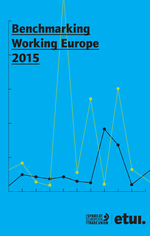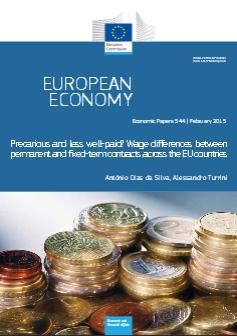European Trade Union Institute (ETUI) Benchmarking Working Europe 2015, ETUI aisbl: Βρυξέλλες, March 2015. Published every year, the report analyses the state of working Europe explaining with the aid of statistics and graphs the main trends in terms of Europe’s macro-economic situation, its labour market development, the situation of wages and collective bargaining, and worker participation. The focus of this year’s Benchmarking report is on the lessons learned – …Read More
Eurozone unemployment – little to do with international competitiveness
Mitchell, B. (2015) “Eurozone unemployment – little to do with international competitiveness“, Bill Mitchell Blog, 21 March. The so-called ‘Informal European Council’ released a document on February 12, 2015 – Preparing for Next Steps on Better Economic Governance in the Euro Area: Analytical Note – which has been used as a background paper to batter the Greeks into submission in the latest round of the Eurozone crisis. It was …Read More
The Juncker Plan – the vehicle for revived European ambition?
Marty, O. (2015) “The Juncker Plan – the vehicle for revived European ambition?“, Fondation Robert Schuman – The Research and Studies Centre on Europe, European Issues – European Issue No. 347, 09 March 2015. The proposed regulation on the creation of the European Fund for Strategic Investments (EFSI) was presented by the European Commission on 13th January 2015. The trilogue is going on until the end of the Latvian …Read More
Labour and finance in the aftermath of the Great Recession
Boeri, T., Garibaldi, P. & Moen, R. E. (2015) “Labour and finance in the aftermath of the Great Recession“, VoxEU Organisation, 19 March. The Great Recession sparked the interest in the link between financial conditions and employment. This column describes results from a new model of labour and finance, incorporating financial imperfections and borrowing constraints. The results uncover a complementarity between firms holding cash and labour market imperfections. Firms …Read More
Precarious and less well-paid? Wage differences between permanent and fixed-term contracts across the EU countries
Dias da Silva . Α. & Turrini, Α. (2015) “Precarious and less well-paid? Wage differences between permanent and fixed-term contracts across the EU countries“, European Commission: European Economy – Economic Papers, No. 544, Brussels: February. This paper analyses the main features of the wage differences between permanent and fixed-term workers and what sources are driving these differences, including the role of labour market institutions. We analyse wage differences between …Read More
Estimating the impact of robots on productivity and employment
Michaels, G. & Graetz, G. (2015) “Estimating the impact of robots on productivity and employment“, VoxEU Organisation, 18 March. Robots may be dangerous not only to the action heroes of cinema, but also to the average manufacturing worker. This column analyses the effect robots have had in 14 industries across 17 developed countries from 1993 to 2007. Industrial robots increase labour productivity, total factor productivity, and wages. While they …Read More
As Cyprus Recovers From Banking Crisis, Deep Scars Remain
Ewing, J. (2015) “As Cyprus Recovers From Banking Crisis, Deep Scars Remain“, The New York Times: International Business, 16 March. The financial world has pretty much moved on since Cyprus was briefly the epicenter of market anxiety. Two years ago this month, the country’s banks failed en masse, A.T.M.s were rationing cash, and the integrity of the eurozone hung in the balance. But after a contentious, internationally brokered “bail-in,’’ …Read More
A framework for banking structural reform
Vives, X. (2015) “A framework for banking structural reform, VoxEU Organisation, 17 March. The 2007–08 crisis revealed regulatory failures that had allowed the shadow banking system and systemic risk to grow unchecked. This column evaluates recent proposals to reform the banking industry. Although appropriate pricing of risk should make activity restrictions redundant, there may nevertheless be complementarities between these two approaches. Ring-fencing may make banking groups more easily resolvable …Read More
Eurozone rebalancing: Are we on the right track for growth? Insights from the CompNet micro-based data
Bartelsman, E., di Mauro, F. & Dorrucci, E. (2015) “Eurozone rebalancing: Are we on the right track for growth? Insights from the CompNet micro-based data“, VoxEU Organisation, 17 March. The shallow growth response to Eurozone rebalancing policies could point towards structural impediments. To uncover such impediments and design effective structural reforms, it is necessary to focus on the path from micro behaviour to macro outcomes. This column argues that …Read More
Does a surprise tightening of monetary policy expand shadow banking?
Nelson, Β., Pinter, G. & Theodoridis, K. (2015) “Does a surprise tightening of monetary policy expand shadow banking?“, VoxEU Organisation, 16 March. There has been an extensive debate over whether central banks should raise interest rates to ‘lean against’ the build-up of leverage in the financial system. This column reports on empirical evidence showing that, in contrast to the conventional view, surprise monetary contractions have tended to increase shadow …Read More






